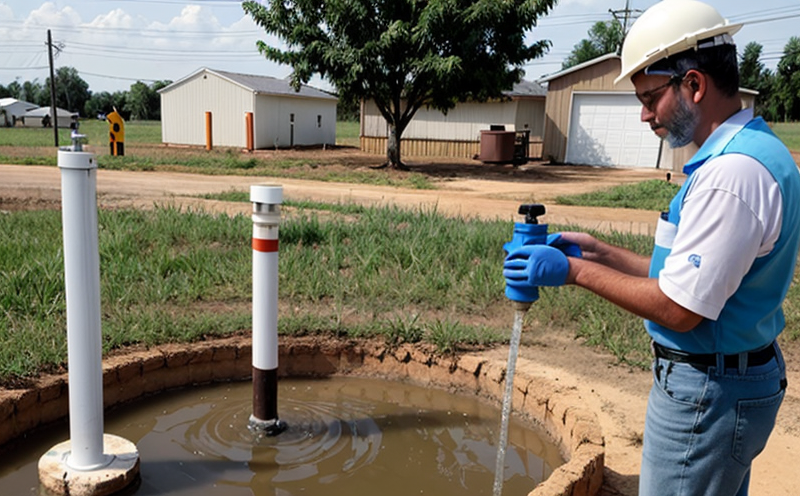ASTM D5072 Groundwater Sampling Procedures Testing
The ASTM D5072 standard provides comprehensive procedures for sampling groundwater to ensure accurate and reliable measurement of the physical, chemical, biological, and microbiological characteristics. This service is crucial in environmental monitoring, compliance assessments, and R&D projects involving water quality.
Groundwater plays a vital role in the ecosystem and human activities, making its quality assessment essential for sustainable development. The ASTM D5072 method ensures that samples are collected under controlled conditions to minimize contamination and bias. This standard is widely used by regulatory bodies, academic institutions, and private companies involved in environmental management.
Sampling procedures include the use of specialized equipment such as peristaltic pumps, sterile sampling bottles, and aseptic techniques. The method specifies the depth at which water should be sampled to ensure it represents the groundwater body accurately. It also details how to handle, store, and transport samples to prevent contamination.
The ASTM D5072 protocol is designed to minimize the risk of sample contamination from external sources such as equipment, personnel, or the environment. Proper sampling techniques are critical in ensuring that the test results reflect the true quality of the groundwater. The standard includes specific guidelines for the collection of both static and dynamic water samples.
Testing parameters under ASTM D5072 include a wide range of indicators such as pH, conductivity, temperature, dissolved oxygen, salinity, and various chemical compounds including nitrates, chlorides, heavy metals, and organic pollutants. The method also addresses the collection of biological and microbiological samples to assess the presence of pathogens.
Groundwater quality testing is essential for compliance with international standards such as ISO 17025 and EN 45001. These standards ensure that laboratories are equipped with the necessary resources, skills, and expertise to perform accurate and reliable tests. The ASTM D5072 method is one of many tools used by laboratories to maintain high-quality testing practices.
Compliance officers and quality managers rely on this service to ensure their operations meet regulatory requirements. R&D engineers use the results from ASTM D5072 sampling to develop new technologies and improve existing processes for water treatment and management. Procurement teams benefit by ensuring that suppliers of groundwater-related products comply with industry standards.
- Minimizes contamination risks through controlled sampling techniques
- Ensures accurate representation of the groundwater body
- Supports compliance with international standards and regulations
- Aids in sustainable development and environmental protection
- Provides reliable data for R&D projects and product improvement
The ASTM D5072 method is a cornerstone of groundwater quality testing, providing the necessary tools to protect our water resources. By adhering to this standard, laboratories can ensure that their sampling procedures are robust and reproducible.
Benefits
The ASTM D5072 groundwater sampling procedure offers several benefits to those involved in environmental monitoring, compliance assessments, and R&D projects. One of the primary advantages is the ability to ensure accurate and reliable measurement of various parameters that influence groundwater quality.
By following this standard, laboratories can minimize contamination risks and provide data that are representative of the true state of the groundwater body. This ensures compliance with international standards such as ISO 17025 and EN 45001, which further enhance the credibility and reliability of test results.
The method also supports sustainable development by providing reliable data for decision-making processes related to water resource management. This is crucial in ensuring that environmental impacts are minimized and resources are used efficiently.
For R&D projects, ASTM D5072 offers a standardized approach to sampling that can be replicated across different locations or time periods. This consistency allows researchers to compare data from various sources accurately and draw meaningful conclusions about the state of groundwater quality.
The standard is also beneficial for compliance officers and quality managers who need accurate and reliable testing results to ensure their operations meet regulatory requirements. By using ASTM D5072, they can demonstrate commitment to environmental stewardship and public health.
Eurolab Advantages
At Eurolab, we pride ourselves on providing the highest quality of groundwater sampling services. Our team of experts ensures that every sample is collected under controlled conditions to minimize contamination and bias.
We use state-of-the-art equipment and follow strict protocols outlined in ASTM D5072 to ensure accurate and reliable results. Our laboratories are equipped with the necessary resources, skills, and expertise to perform comprehensive testing of various parameters including pH, conductivity, temperature, dissolved oxygen, salinity, nitrates, chlorides, heavy metals, and organic pollutants.
Our commitment to quality is reflected in our adherence to international standards such as ISO 17025 and EN 45001. These standards ensure that we provide the most accurate and reliable testing services in the industry. Our laboratories are equipped with advanced instrumentation, including peristaltic pumps, sterile sampling bottles, and aseptic techniques.
We also offer customized solutions to meet the specific needs of our clients. Whether you need assistance with a single sample or an entire project involving multiple parameters, Eurolab has the expertise to deliver results that meet your requirements.
Why Choose This Test
- Achieves accurate and reliable measurement of groundwater quality parameters
- Minimizes contamination risks through controlled sampling techniques
- Ensures accurate representation of the groundwater body
- Supports compliance with international standards such as ISO 17025 and EN 45001
- Aids in sustainable development and environmental protection
- Provides reliable data for R&D projects and product improvement





